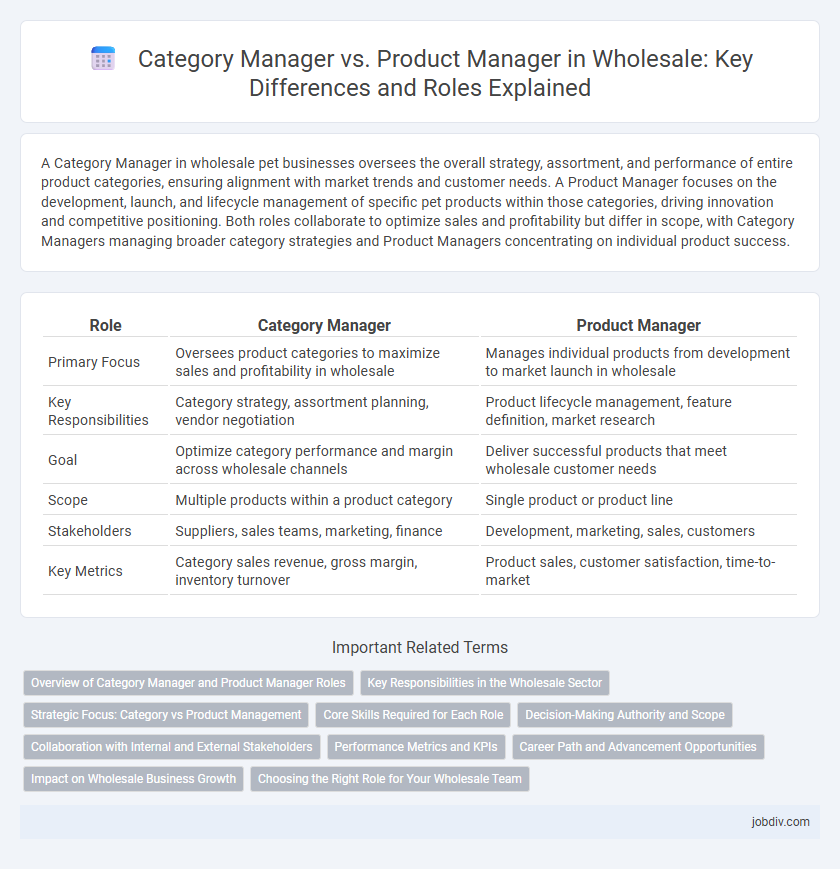A Category Manager in wholesale pet businesses oversees the overall strategy, assortment, and performance of entire product categories, ensuring alignment with market trends and customer needs. A Product Manager focuses on the development, launch, and lifecycle management of specific pet products within those categories, driving innovation and competitive positioning. Both roles collaborate to optimize sales and profitability but differ in scope, with Category Managers managing broader category strategies and Product Managers concentrating on individual product success.
Table of Comparison
| Role | Category Manager | Product Manager |
|---|---|---|
| Primary Focus | Oversees product categories to maximize sales and profitability in wholesale | Manages individual products from development to market launch in wholesale |
| Key Responsibilities | Category strategy, assortment planning, vendor negotiation | Product lifecycle management, feature definition, market research |
| Goal | Optimize category performance and margin across wholesale channels | Deliver successful products that meet wholesale customer needs |
| Scope | Multiple products within a product category | Single product or product line |
| Stakeholders | Suppliers, sales teams, marketing, finance | Development, marketing, sales, customers |
| Key Metrics | Category sales revenue, gross margin, inventory turnover | Product sales, customer satisfaction, time-to-market |
Overview of Category Manager and Product Manager Roles
Category Managers in wholesale oversee product group performance, pricing strategies, supplier relationships, and inventory optimization to maximize category profitability and market share. Product Managers focus on product lifecycle management, including development, marketing, and customer feedback analysis to ensure product-market fit and competitive positioning. Both roles require strong data analysis, cross-functional collaboration, and strategic decision-making skills to drive revenue growth in wholesale environments.
Key Responsibilities in the Wholesale Sector
Category Managers in wholesale focus on analyzing market trends, managing product categories, and optimizing assortment strategies to maximize category profitability and ensure alignment with customer demand. Product Managers emphasize product lifecycle management, coordinating with suppliers for product development, and overseeing pricing, promotions, and inventory levels to drive sales growth. Both roles require collaboration with sales, marketing, and supply chain teams but differ in scope, with Category Managers handling broader category strategies and Product Managers concentrating on individual product performance.
Strategic Focus: Category vs Product Management
Category Managers concentrate on the strategic oversight of multiple products within a category, optimizing product assortment, pricing, and promotion to maximize overall category performance and customer satisfaction. Product Managers focus on the lifecycle and development of individual products, driving innovation, feature enhancements, and market fit to achieve specific product success and revenue targets. Strategic focus for Category Managers involves cross-product synergy and category profitability, while Product Managers prioritize detailed product strategy and execution.
Core Skills Required for Each Role
Category Managers excel in market analysis, vendor negotiation, and strategic assortment planning to optimize product categories and drive sales growth. Product Managers require strong skills in product lifecycle management, cross-functional collaboration, and customer needs assessment to develop and enhance product offerings. Both roles demand analytical thinking and communication proficiency but differ in their focus on category profitability versus individual product innovation.
Decision-Making Authority and Scope
Category Managers hold broader decision-making authority with responsibility for strategic planning, pricing, promotion, and assortment across an entire category, driving cross-functional collaboration in wholesale operations. Product Managers focus specifically on product lifecycle management, including development, positioning, and market fit, making tactical decisions within the product scope. The scope of a Category Manager extends to managing category profitability and vendor relationships, whereas Product Managers concentrate on optimizing individual product performance.
Collaboration with Internal and External Stakeholders
Category Managers coordinate closely with sales teams, suppliers, and marketing departments to optimize product assortment and pricing strategies, ensuring alignment with market demands and company goals. Product Managers engage with R&D, customer support, and external vendors to drive product development, enhancements, and lifecycle management, focusing on meeting customer needs and innovation. Effective collaboration between both roles enhances inventory management, supplier relationships, and customer satisfaction in wholesale operations.
Performance Metrics and KPIs
Category Managers in wholesale prioritize metrics such as category sales growth, gross margin return on investment (GMROI), and inventory turnover to optimize product assortment and supplier negotiations. Product Managers focus on KPIs like product profitability, time-to-market, and customer satisfaction scores to enhance individual product performance and lifecycle management. Both roles utilize data-driven insights, but Category Managers emphasize broader category-level performance while Product Managers track detailed product-specific outcomes.
Career Path and Advancement Opportunities
Category Managers in wholesale typically focus on strategic planning, managing product assortments across multiple suppliers, and driving category sales growth, positioning them for advancement into senior leadership roles like Head of Merchandising or Commercial Director. Product Managers concentrate on product lifecycle management, coordinating with development, procurement, and marketing teams, which can lead to specialized roles such as Product Director or Innovation Manager. Career progression for Category Managers often involves broader business impact responsibilities, whereas Product Managers expand through deep product expertise and cross-functional project leadership.
Impact on Wholesale Business Growth
Category Managers drive wholesale business growth by analyzing market trends and customer buying behaviors to optimize product assortments and pricing strategies, significantly boosting sales performance and inventory turnover. Product Managers influence growth by overseeing product development and lifecycle management, ensuring offerings meet market demands and differentiate from competitors, enhancing brand value and customer loyalty. Both roles collaboratively improve wholesale profitability through strategic product positioning and supply chain coordination.
Choosing the Right Role for Your Wholesale Team
A Category Manager in wholesale focuses on overseeing a group of related products to optimize sales performance and supplier relationships, while a Product Manager is responsible for the lifecycle of a specific product, including development, positioning, and market strategy. Choosing the right role depends on whether the wholesale team prioritizes broader category profitability and assortment management or deep product-specific expertise and innovation. Aligning the role with strategic goals enhances inventory turnover, supplier negotiation, and customer satisfaction within the wholesale business.
Category Manager vs Product Manager Infographic

 jobdiv.com
jobdiv.com